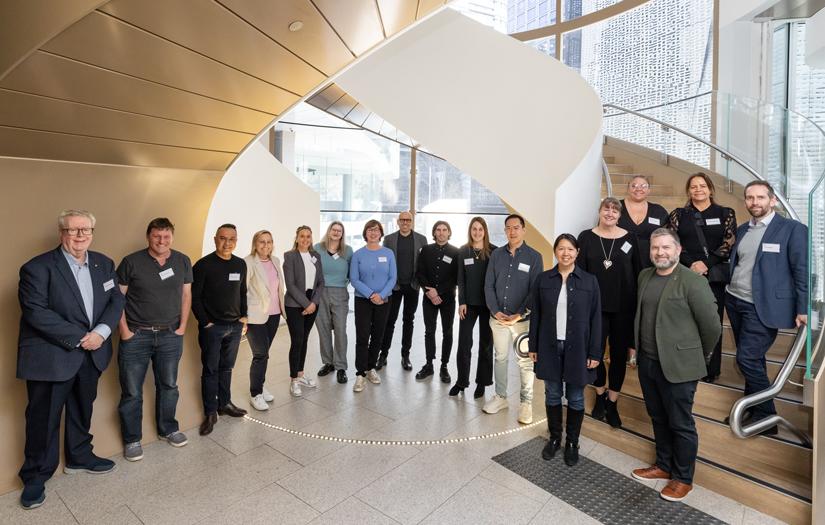
Can artificial intelligence make healthcare safer, better, more affordable, and more equitable – and empower this change on a global scale?
This was the big question that 20 UTS Ambassadors discussed at the 2024 UTS Alumni Forum. The second annual forum brought 10 leading academics focusing on AI and health together with notable alumni leaders to develop a vision for the future of AI and health innovation – from local partnerships to global impact.
UTS is ranked #1 institution in Australia for AI by The Australian’s Research Awards and #4 in the world for AI by the U.S. News Best Global Universities Subject Rankings. UTS is also home to Australia’s largest centre for AI: The Australian Artificial Intelligence Institute (AAII), which has published over 1,300 papers.
This year’s Alumni Forum, sponsored by the UTS Faculty of Health, highlighted some of the amazing researchers working in health and AI at UTS and marked the beginning of what we hope to be an inspiring future of collaboration, discovery, innovation, and healthier lives for everyone.
Alumni participants at the Forum are our distinguished UTS Ambassadors. These Australia-based alumni graduated with degrees across UTS' faculties, and work in the top of their fields across a diverse number of sectors. This year they explored the social dimensions of new AI technologies and brought unique external insights to the work being undertaken at UTS.
The need for change
Forum participants debated the pressing challenges currently facing Australia's healthcare system:
- A system that is rigid and slow to change. Due to the growing demands on healthcare, there is significant need for capacity building. Public awareness about the benefits of AI technologies has to be developed and there exists a level of fear and mistrust of AI. People will need training on how to manage AI technologies, and the Australian healthcare system can do better in encouraging innovation and showcasing the success of early adopters of AI support in healthcare.
- Limited, dispersed, or disconnected access to healthcare data. Patients can encounter little to no access to their historical data, especially when they change doctors. Lack of common terminology can cause data fragmentation and language differences between clinicians and patients can lead to imprecise diagnosis. Stricter standards for AI data security and privacy still need to be established.
- Unequal access to healthcare. Presently, those on higher incomes and those located in major cities are more able to access the best healthcare. People on lower incomes rely more on public healthcare and encounter longer wait times for treatment. Additionally, living in a rural area and cultural distinctions such as language were identified as barriers to accessible healthcare.
An ideal future for AI in healthcare
Forum discussion created a vison of how UTS can lead an AI-assisted healthcare future that could emerge by the year 2040:
- A ‘UTS Silicon Valley of Healthcare’ will lead Australian innovation. A healthcare future – co-designed by regulators, clinicians, and patients – that is less institutionalised and less resistant to change will lead to greater adoption of AI. In this future, quantum computing will be commercially available, and new technological advances can be rapidly tested in clinical settings. Holistic healthcare that includes multimodal AI models and advanced image and text recognition can allow innovation to flourish.
- Global data is used to make local, personal healthcare decisions. All healthcare data can be stored securely in the cloud, and people can access their data and use AI to diagnose health issues in a cost-effective way, on their own, without extended wait times. Different languages will be translated instantly between patients and clinicians, and non-verbal people and those with speech disabilities will be able to telepathically communicate with AI robots, which can also assist with mobility and diet.
- Every Australian will have a healthcare-enabled smart device. Data collected by wearable devices can be mined to discover new medical solutions and help create an optimal healthcare system for everyone – regardless of culture, background, or proximity to urban areas. Supported by AI, those who work in healthcare will no longer be consumed with tedious and overwhelming administrative activities. They are freed to provide the best possible care for their patients, contributing to a much healthier and happier society.
The future envisioned at the Alumni Forum showcases the potential of UTS research in health and AI. Our UTS Ambassadors encourage fellow alumni worldwide to advocate for the university’s work in these critical fields.
To be kept informed about UTS’s ongoing research in Health and AI, follow us on social media:
The 2024 Alumni Forum was sponsored by Professor Debra Anderson, Dean, Faculty of Health, facilitated by Professor Chris Riedy from the Institute for Sustainable Futures, and hosted by UTS Advancement.

